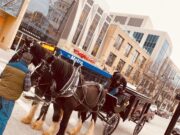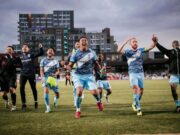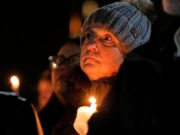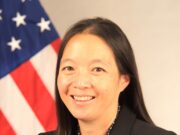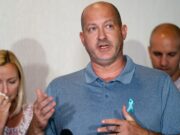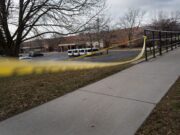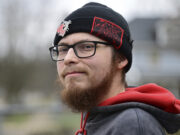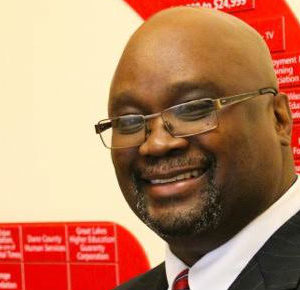The State of Black America is teetering on a fence. On one side there is great hope and vision. On the other side is fear, exasperation and despondency. The criminal justice system, the President and the lack of choices parents of color have with their kids were just some of the issues explored during a Town Hall meeting on the State of Black America Wednesday night.
The Urban League of Greater Madison Young Professionals hosted a viewing party in a restaurant at Point Cinema on Madison’s west side Thursday night. Guests gathered to view a nationally televised discussion about the issues the African-American community faces on both micro and macro levels across the country.
Disparities exist at every turn. School Boards are under-representing people of color. The over thirty-year-old War on Drugs has claimed the lives of nearly three generations of minorities as prison populations swell and educational opportunities dwindle. The Affordable Care Act threatens to put a strain on the finances of the poorest and most financially challenged communities both locally and nationally.
Dr. Ruben Anthony, the president and CEO of Urban League of Greater Madison, said the Affordable Care Act was one of the greatest issues facing blacks and other minorities moving forward.
“The biggest issue that’s facing us right now, we think, is the Affordable Care Act,” Anthony said. “Making sure that individuals, particularly seniors and elderly people and poor people, are not locked out of health care. It seems like $3t would be stripped away from the health care bill and directed towards tax savings for the rich. That would move the rich from a 35 percent tax bracket to a 15 percent tax bracket on the backs of poor tax payers. That’s the secret part about the Affordable Care Act. In order to finance the tax cut they have to strip $3t away from Medicare and all these other programs.”
Black and Brown communities would bear the brunt of the effects of the Affordable Care Act. The lack of living wage job opportunities for people of color combined with the higher premiums would put a huge financial strain on communities already stretched thin financially.
Anthony was part of a contingent of Urban League Guild members who attended Town Hall meetings in Washington DC last month. The Urban Leagues of both Milwaukee and Madison visited the Wisconsin delegation offices of Representative Gwen Moore, Congressman Ron Kind and Mark Pocan, Senators Ron Johnson and Tammy Baldwin, as well House Speaker Paul Ryan.
Anthony said they were conducting those visits as the Affordable Care Act was passed in Congress. He said they spoke with Representative Moore for hours about the devastating effects that bill could have on minority communities.
Locally, the City of Milwaukee ranks highest in the nation in terms of disparities with unemployment equality. Each year approximately 80 metropolitan areas around the country are studied for disparity metrics. These metrics compare the opportunities afforded to whites, which is deemed to be 100 percent against those same opportunities for African-Americans and Hispanics.
Milwaukee led the nation for the second straight year with the largest disparity in unemployment between blacks and whites, Anthony said — 13.8 percent unemployment for blacks compared to 2.7 percent for whites.
“Milwaukee has the worst numbers in the country,” Anthony said. “The index in Milwaukee is 19.6. They compare the index to the number 100. So while whites in Milwaukee are at 100, blacks are at 19.6 percent in terms of the unemployment equality index. So we have problems.”
Madison was not one of the metropolitan areas chosen for the study. But Anthony believes Madison would rank even worse than Milwaukee on the equality index.
“I believe that the numbers in Madison are even worse than what they are in Milwaukee. Because white people in Madison do so well and Black people do so poorly. When you look at the things they calculate this index on, I suspect that in at least some of the same problems Milwaukee has in comparison of unemployment between blacks and whites, Madison might be even worse.”
It has been the mission of organizations like the Urban League to provide mentorship for youth of color and try to guide them into finding a career path that will work for each individual person. While pursuing higher education can be a path out of poverty, Anthony says it is more important for young men and women to find a skill that they can use to earn a living wage.
“You have to start early,” Anthony said. “One of the things we do in the 21rst Century Careers Program is we start having a conversation with young people early so they can explore careers and then they can make a determination of what path that career requires. Lots of African-Americans in Madison don’t make $12-15 an hour. We try to have training programs that will allow people to make $12-15. We believe that people need to make a higher living wage and $15 an hour will help.”
Higher living wages, affordable health care, eliminating the war on drugs and better choices for local education were the themes most discussed during the Town Hall meeting. While many issues were discussed and several solutions to those problems were brought up, trepidation about the potential plight of the African-American community under the current Presidential Administration seemed to be high.
For Anthony and others in the daily grind of helping shape the local community, however, it’s about more than just politics. These issues did not start when any particular President took office and they won’t be over when that President is gone.
“We have to be watchful as we move forward,” Anthony said as the audience filed out of the auditorium. “And we have to really come together as a community and be concerned about how brown and black people and poor people are being educated. We really have to be concerned about what’s happening as health care is being stripped away. But we have a motto at Urban League: Forward ever, backwards never.”


